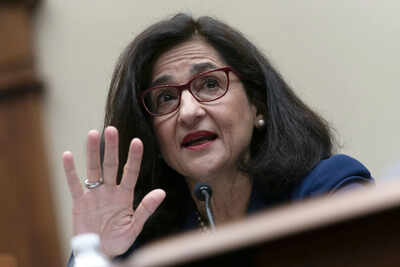ARTICLE AD BOX

FILE: (AP Photo/Jose Luis Magana, File)
Minouche Shafik’s tenure as president of Columbia University was brief but high-profile, placing her at the intersection of academia, politics, and public scrutiny. Appointed in July 2023, Shafik’s leadership faced immediate tests as campus protests erupted over the Israel–Hamas conflict, compelling her to make difficult decisions on free speech, safety, and institutional responsibility.
Her resignation in August 2024 closed a tumultuous chapter, but it also highlighted her capacity to navigate complex crises—skills now recognized internationally with her appointment as chief economic adviser to British Prime Minister Keir Starmer.The move underscores the transatlantic appeal of her expertise. While her Columbia presidency was controversial, it demonstrated her willingness to confront challenges head-on, whether managing protests, engaging with faculty, or addressing Congressional scrutiny over campus antisemitism.
Now, Shafik is stepping back into public service at the highest level, this time in the UK, where her academic and economic credentials will inform national policy amid inflationary pressures and economic stagnation.
From Alexandria to global academia
Born in Alexandria, Egypt, in 1962 to a family of educators, Shafik moved to the United States as a child after her father’s property was nationalized. Early exposure to displacement and adaptation shaped her global outlook and intellectual curiosity.
Shafik’s education was distinguished and international. She spent a year at the American University in Cairo, earned a Bachelor of Arts in economics and politics from the University of Massachusetts Amherst in 1983—summa cum laude and Phi Beta Kappa—followed by a Master of Science in economics from the London School of Economics in 1986, and a Doctor of Philosophy in economics from Oxford University in 1989. These qualifications provided a foundation for a career spanning academia, central banking, and international economic governance.
Leadership across institutions
Shafik first made her mark at the World Bank, rising to vice president, then transitioned to public service as permanent secretary at the UK’s Department for International Development (2008–2011). She later served as deputy managing director of the International Monetary Fund, overseeing operations at a global scale. Between 2014 and 2017, she returned to the UK as deputy governor of the Bank of England, where she managed markets and banking during a critical post-crisis period.
Columbia University and the test of leadership
Her appointment as Columbia’s 20th president was a milestone in her academic career. The role placed her at the forefront of an institution navigating political and social tensions. Campus protests over the Israel–Hamas war tested her leadership, and her decisions—especially calling in police to manage demonstrations—drew both praise and criticism. Congressional inquiries and faculty pressure ultimately led to her resignation, yet the episode solidified her reputation as a decisive leader under pressure.
Returning to public service
Since 2020, Shafik has been a life peer in the House of Lords and more recently served as chair of the Victoria and Albert Museum, showcasing her ability to operate at the intersection of policy, culture, and governance. Her appointment as Starmer’s chief economic adviser highlights the enduring relevance of her experience and her capacity to translate academic insight into actionable policy.
Why her appointment matters
Shafik brings to the UK government a rare combination: deep academic insight, experience leading international financial institutions, and firsthand leadership in politically charged environments. For Starmer, her appointment signals a commitment to evidence-based economic policy and the recognition that navigating today’s economy demands expertise honed across continents and sectors.



.png)
.png)
.png)
















 3 hours ago
2
3 hours ago
2









 English (US) ·
English (US) ·